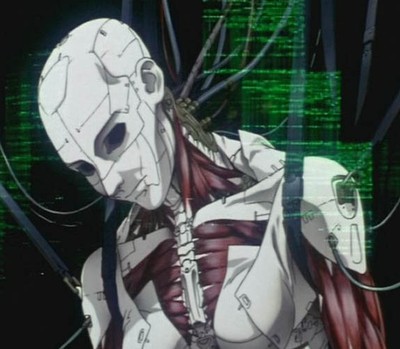We don't use intrusive ads and hope you disable your adblock.

Cyborg
Description
A cyborg is a cybernetic organism (i.e. an organism that has both artificial and natural systems). The term was coined in 1960 when Manfred Clynes and Nathan Kline used it in an article about the advantages of self-regulating human-machine systems in outer space. D. S. Halacy`s Cyborg: Evolution of the Superman in 1965 featured an introduction which spoke of a "new frontier" that was "not merely space, but more profoundly the relationship between `inner space` to `outer space` -a bridge...between mind and matter." The cyborg is often seen today merely as an organism that has enhanced abilities due to technology, but this perhaps oversimplifies the category of feedback.
Fictional cyborgs are portrayed as a synthesis of organic and synthetic parts, and frequently pose the question of difference between human and machine as one concerned with morality, free will, and empathy. Fictional cyborgs may be represented as visibly mechanical (e.g. the Cybermen in the Doctor Who franchise or The Borg from Star Trek); or as almost indistinguishable from humans (e.g. the "Human" Cylons from the re-imagining of Battlestar Galactica). The 1970s television series The Six Million Dollar Man featured one of the most famous fictional cyborgs. Cyborgs in fiction often play up a human contempt for over-dependence on technology, particularly when used for war, and when used in ways that seem to threaten free will. Cyborgs are also often portrayed with physical or mental abilities far exceeding a human counterpart (military forms may have inbuilt weapons, among other things).
Real (as opposed to fictional) cyborgs are more frequently people who use cybernetic technology to repair or overcome the physical and mental constraints of their bodies. While cyborgs are commonly thought of as mammals, they can be any kind of organism.
[
Fictional cyborgs are portrayed as a synthesis of organic and synthetic parts, and frequently pose the question of difference between human and machine as one concerned with morality, free will, and empathy. Fictional cyborgs may be represented as visibly mechanical (e.g. the Cybermen in the Doctor Who franchise or The Borg from Star Trek); or as almost indistinguishable from humans (e.g. the "Human" Cylons from the re-imagining of Battlestar Galactica). The 1970s television series The Six Million Dollar Man featured one of the most famous fictional cyborgs. Cyborgs in fiction often play up a human contempt for over-dependence on technology, particularly when used for war, and when used in ways that seem to threaten free will. Cyborgs are also often portrayed with physical or mental abilities far exceeding a human counterpart (military forms may have inbuilt weapons, among other things).
Real (as opposed to fictional) cyborgs are more frequently people who use cybernetic technology to repair or overcome the physical and mental constraints of their bodies. While cyborgs are commonly thought of as mammals, they can be any kind of organism.
[
Related Anime

TV Series
2005
13 Eps
Completed

TV Series
2013
12 Eps
Completed